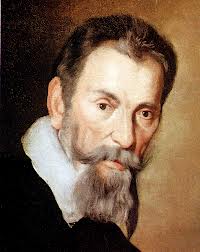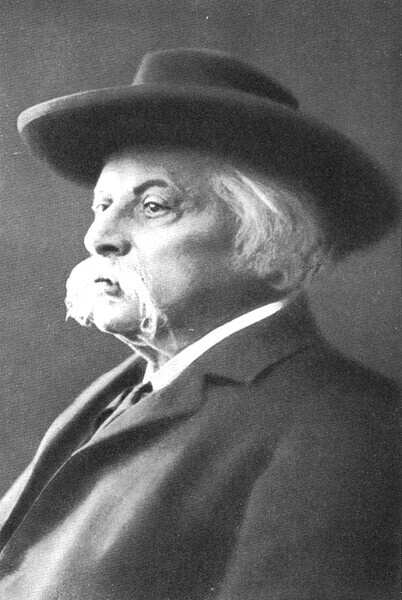This Week in Classical Music: May 15, 2023.Monteverdi and Goldmark.One of our all-time favorite composers, Claudio Monteverdi, was born (or at least baptized) in Cremona on this day in 1567.A seminal figure in European music history, he spanned two traditions, the old, Renaissance, and the new, Baroque, and in the process created the new art of opera.We’ve written about him many times, so today we’ll just present one section, Laudate pueri, from his Vespro della Beata Vergine (Vespers for the Blessed Virgin), also known as his 1610 Vespers.Monteverdi composed the Vespers while in Mantua, at the court of the Gonzagas.It was published in Venice and dedicated to Pope Paul V, famous for his friendship and support of Galileo Galilei (but also for nepotism: he made his nephew, Cardinal Scipione Borghese so rich that it allowed Scipione to start what is now known as the Borghese Collection of paintings and sculptures).Back to the music, though: here is Laudate pueri, performed by the British ensemble The Sixteen under the direction of their founder, Harry Christophers.
Carl Goldmark is almost forgotten, but in his day, he was one of the most popular composers in the German-speaking world.His opera Die Königin von Saba (The Queen of Sheba) was performed continuously from the day it successfully premiered in 1875 in Vienna’s Hofoper, till 1938, when Austria was taken over by the Nazis in the so-called Anschluss.Goldmark was born on May 18th of 1830 in Keszthely, a Hungarian town in the Austro-Hungarian Empire.Goldmark was Jewish (his father was a cantor in the local synagogue); the family came from Galicia, and Goldmark’s first language was Yiddish – he never spoke Hungarian and learned German as a teenager.Goldmark studied the violin in Vienna and later supported himself by playing the instrument in various local orchestras.Around this time, he accepted the German culture as his own, which was the path for many upwardly mobile Jews in Austria and Germany in the second half of the 19th century.Around 1862 he became friends with Johannes Brahms, who had recently moved to Vienna from Hamburg.Goldmark’s first successful composition was a concert overture Sakuntala, based on the Indian epic Mahabharata, which premiered in 1865.Goldmark followed it with another exotic composition, the above-mentioned opera Die Königin von Saba.It was a spectacular success and performances of the opera were mounted internationally.Goldmark became part of the establishment, receiving prizes and honors, and presiding over important musical juries.His 70th and 80th birthdays were celebrated nationally with great pomp.He helped Mahler get his appointment at the Court Opera in 1897; some years later, he did a similar favor to Arnold Schoenberg, who was seeking an appointment to the Imperial Academy of Music and Arts. Goldmark died several months into WWI, grieving the loss of his grandchild who was killed in one of the first actions in Serbia.
Goldmark’s Violin Concerto no. 1 was composed in 1877.It’s a wonderful composition, rarely performed these days.Here is a marvelous recording made by Nathan Milstein in 1957.Harry Blech conducts the Philharmonia Orchestra.We wonder why it’s not being played more often.
Monteverdi and Goldmark, 2023
This Week in Classical Music: May 15, 2023. Monteverdi and Goldmark. One of our all-time favorite composers, Claudio Monteverdi, was born (or at least baptized) in Cremona on this day in 1567. A seminal figure in European music history, he spanned two traditions, the old, Renaissance, and the new, Baroque, and in the process created the new art of opera. We’ve written about him many times, so today we’ll just present one section, Laudate pueri, from his Vespro della Beata Vergine (Vespers for the Blessed Virgin), also known as his 1610 Vespers. Monteverdi composed the Vespers while in Mantua, at the court of the Gonzagas. It was published in Venice and dedicated to Pope Paul V, famous for his friendship and support of Galileo Galilei (but also for nepotism: he made his nephew, Cardinal Scipione Borghese so rich that it allowed Scipione to start what is now known as the Borghese Collection of paintings and sculptures). Back to the music, though: here is Laudate pueri, performed by the British ensemble The Sixteen under the direction of their founder, Harry Christophers.
1567. A seminal figure in European music history, he spanned two traditions, the old, Renaissance, and the new, Baroque, and in the process created the new art of opera. We’ve written about him many times, so today we’ll just present one section, Laudate pueri, from his Vespro della Beata Vergine (Vespers for the Blessed Virgin), also known as his 1610 Vespers. Monteverdi composed the Vespers while in Mantua, at the court of the Gonzagas. It was published in Venice and dedicated to Pope Paul V, famous for his friendship and support of Galileo Galilei (but also for nepotism: he made his nephew, Cardinal Scipione Borghese so rich that it allowed Scipione to start what is now known as the Borghese Collection of paintings and sculptures). Back to the music, though: here is Laudate pueri, performed by the British ensemble The Sixteen under the direction of their founder, Harry Christophers.
Carl Goldmark is almost forgotten, but in his day, he was one of the most popular composers in the German-speaking world. His opera Die Königin von Saba (The Queen of Sheba) was performed continuously from the day it successfully premiered in 1875 in Vienna’s Hofoper, till 1938, when Austria was taken over by the Nazis in the so-called Anschluss. Goldmark was born on May 18th of 1830 in Keszthely, a Hungarian town in the Austro-Hungarian Empire. Goldmark was Jewish (his father was a cantor in the local synagogue); the family came from Galicia, and Goldmark’s first language was Yiddish – he never spoke Hungarian and learned German as a teenager. Goldmark studied the violin in Vienna and later supported himself by playing the instrument in various local orchestras. Around this time, he accepted the German culture as his own, which was the path for many upwardly mobile Jews in Austria and Germany in the second half of the 19th century. Around 1862 he became friends with Johannes Brahms, who had recently moved to Vienna from Hamburg. Goldmark’s first successful composition was a concert overture Sakuntala, based on the Indian epic Mahabharata, which premiered in 1865. Goldmark followed it with another exotic composition, the above-mentioned opera Die Königin von Saba. It was a spectacular success and performances of the opera were mounted internationally. Goldmark became part of the establishment, receiving prizes and honors, and presiding over important musical juries. His 70th and 80th birthdays were celebrated nationally with great pomp. He helped Mahler get his appointment at the Court Opera in 1897; some years later, he did a similar favor to Arnold Schoenberg, who was seeking an appointment to the Imperial Academy of Music and Arts. Goldmark died several months into WWI, grieving the loss of his grandchild who was killed in one of the first actions in Serbia.
performed continuously from the day it successfully premiered in 1875 in Vienna’s Hofoper, till 1938, when Austria was taken over by the Nazis in the so-called Anschluss. Goldmark was born on May 18th of 1830 in Keszthely, a Hungarian town in the Austro-Hungarian Empire. Goldmark was Jewish (his father was a cantor in the local synagogue); the family came from Galicia, and Goldmark’s first language was Yiddish – he never spoke Hungarian and learned German as a teenager. Goldmark studied the violin in Vienna and later supported himself by playing the instrument in various local orchestras. Around this time, he accepted the German culture as his own, which was the path for many upwardly mobile Jews in Austria and Germany in the second half of the 19th century. Around 1862 he became friends with Johannes Brahms, who had recently moved to Vienna from Hamburg. Goldmark’s first successful composition was a concert overture Sakuntala, based on the Indian epic Mahabharata, which premiered in 1865. Goldmark followed it with another exotic composition, the above-mentioned opera Die Königin von Saba. It was a spectacular success and performances of the opera were mounted internationally. Goldmark became part of the establishment, receiving prizes and honors, and presiding over important musical juries. His 70th and 80th birthdays were celebrated nationally with great pomp. He helped Mahler get his appointment at the Court Opera in 1897; some years later, he did a similar favor to Arnold Schoenberg, who was seeking an appointment to the Imperial Academy of Music and Arts. Goldmark died several months into WWI, grieving the loss of his grandchild who was killed in one of the first actions in Serbia.
Goldmark’s Violin Concerto no. 1 was composed in 1877. It’s a wonderful composition, rarely performed these days. Here is a marvelous recording made by Nathan Milstein in 1957. Harry Blech conducts the Philharmonia Orchestra. We wonder why it’s not being played more often.